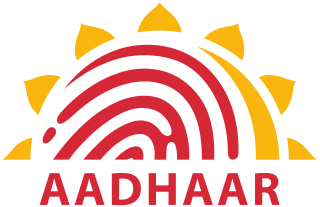An identity document is any document that may be used to prove a person's identity. If issued in a small, standard credit card size form, it is usually called an identity card, or passport card. Some countries issue formal identity documents, as national identification cards that may be compulsory or non-compulsory, while others may require identity verification using regional identification or informal documents. When the identity document incorporates a person's photograph, it may be called photo ID.

Nandan Mohanrao Nilekani is an Indian entrepreneur. He co-founded Infosys and is the non-executive chairman of Infosys replacing R Seshasayee and Ravi Venkatesan, who were the co-chairs of the board, on 24 August 2017. After the exit of Vishal Sikka, Nilekani was appointed as non-executive chairman of the board effective 24 August 2017. He was the chairman of the Unique Identification Authority of India (UIDAI). After a successful career at Infosys, he headed the Government of India's technology committee, TAGUP. He is a member of Indian National Congress but not active in politics as of 2019.
In electoral systems, voter registration is the requirement that a person otherwise eligible to vote must register on an electoral roll, which is usually a prerequisite for being entitled or permitted to vote.
India has a parliamentary system as defined by its constitution, with power distributed between the union government and the states. India's democracy is the largest democracy in the world.

A permanent account number (PAN) is a ten-character alphanumeric identifier Foundational ID, issued in the form of a laminated "PAN card", by the Indian Income Tax Department, to any person who applies for it or to whom the department allots the number without an application. It can also be obtained in the form of a PDF file known as e-PAN from the website of the Indian Income Tax Department.
A national identification number, national identity number, or national insurance number or JMBG/EMBG is used by the governments of many countries as a means of tracking their citizens, permanent residents, and temporary residents for the purposes of work, taxation, government benefits, health care, and other governmentally-related functions.

Aadhaar is a 12-digit unique identity number that can be obtained voluntarily by all residents of India, based on their biometrics and demographic data. The data is collected by the Unique Identification Authority of India (UIDAI), a statutory authority established in January 2009 by the Government of India, under the jurisdiction of the Ministry of Electronics and Information Technology, following the provisions of the Aadhaar Act, 2016.

There are five types of elections in the United Kingdom: elections to the House of Commons of the United Kingdom, elections to devolved parliaments and assemblies, local elections, mayoral elections, and police and crime commissioner elections. Within each of those categories, there may also be by-elections. Elections are held on Election Day, which is conventionally a Thursday, and under the provisions of the Dissolution and Calling of Parliament Act 2022 the timing of general elections can be held at the discretion of the prime minister during any five-year period. All other types of elections are held after fixed periods, though early elections to the devolved assemblies and parliaments can occur in certain situations. The five electoral systems used are: the single member plurality system (first-past-the-post), the multi-member plurality, the single transferable vote, the additional member system, and the supplementary vote.
An anonymous elector is generally a registered voter whose safety would be at risk if their details were available on a public electoral register.

A voter identification law is a law that requires a person to show some form of identification in order to vote. In some jurisdictions requiring photo IDs, voters who do not have photo ID often must have their identity verified by someone else or sign a Challenged Voter Affidavit in order to receive a ballot to vote.
Biometrics refers to the automated recognition of individuals based on their biological and behavioral characteristics, not to be confused with statistical biometrics; which is used to analyse data in the biological sciences. Biometrics for the purposes of identification may involve DNA matching, facial recognition, fingerprints, retina and iris scanning, voice analysis, handwriting, gait, and even body odor.

Ration cards are an official document issued by state governments in India to households that are eligible to purchase subsidised food grain from the Public Distribution System under the National Food Security Act (NFSA). They also serve as a common form of identification for many Indians.
National Electoral Roll Purification and Authentication Programme (NERPAP) is voter registration project of the Election Commission of India. It will link the Elector's Photo Identity Card (EPIC) with the Aadhaar number of the registered voter. It aims to create an error-free voter identification system in India, especially by removing duplications. The project was launched on 3 March 2015.

The Election Commission of India (ECI) is a constitutional body established by the Constitution of India empowered to conduct free and fair elections in India. The Election commission is headed by a Chief Election Commissioner and consists of two other Election Commissioners.

Statewide elections in the U.S. state of North Dakota take place every two years. Most executive offices and all legislators are elected to four-year terms, with half the terms expiring on U.S. Presidential election years, and the other half expiring on mid-term election years.
Identity documents of India are increasingly used to transact and obtain government benefits in India.
Udyog Aadhaar is a twelve digit Unique Identification Number provided by the Indian Ministry of Micro, Small and Medium Enterprises beginning in September 2015. It is also known as Aadhaar for business. As of July 2018, more than 4.8 million MSMEs in India are registered under Udyog Aadhaar.

The Elections Act 2022 is an Act of the Parliament of the United Kingdom, introduced to the House of Commons in July 2021, and receiving Royal Assent on 28 April 2022. The Act makes photo identification compulsory for in-person voting in Great Britain for the first time. Until then, Northern Ireland had been the only part of the UK to require voter identification. The Act also gives the government new powers over the independent elections regulator; the Electoral Commission has said it is "concerned" about its independence from political influence in the future.

Neurotechnology is an algorithm and software development company founded in Vilnius, Lithuania in 1990.






















